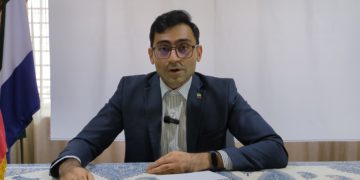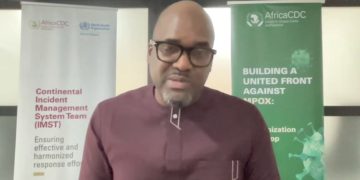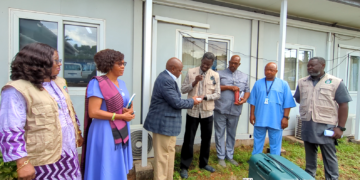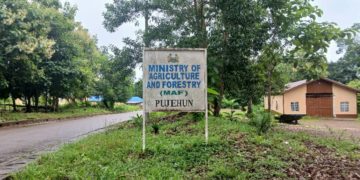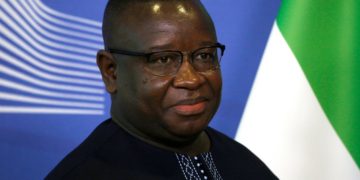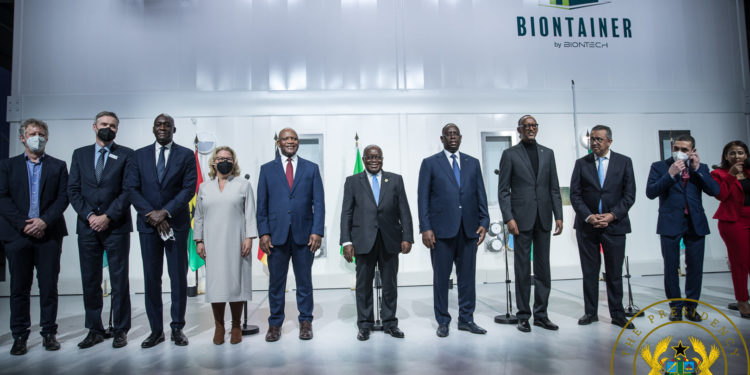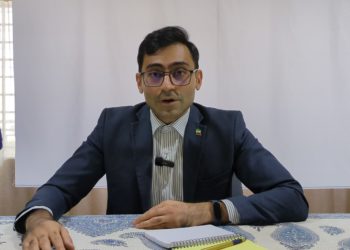Ghana, Rwanda and Senegal have announced a partnership to jointly produce vaccines for three major health issues of concern to the African continent.
The three countries will manufacture, fill, finish, and package the mRNA vaccines for COVID-19, Malaria and Tuberculosis, in collaboration with the German biotechnology firm BioNTech.
The deal was negotiated under the auspices of the African Union and European Union.
Leaders of the three countries met with officials of BioNTech on Wednesday, February 16, in the German city of Marburg, where the deal was finalized.
A press release issued by BioNTech revealed that the deal involves the deployment of its landmark mobile vaccine manufacturing units (BioNTainer) or modular vaccine production facility, in Rwanda and Senegal, whereas Ghana will support the process with fill-and-finish capacities.
BioNTainer is a container equipped with state-of-the-art manufacturing solutions. It was specifically designed to be deployed in Africa to promote scalable vaccine production.
The BioNTainer will be equipped to manufacture a range of mRNA-based vaccines targeted to the needs of the African Union member states, starting with the Pfizer-BioNTech COVID-19 vaccine and later BioNTech’s malaria and tuberculosis vaccines which are at investigation stage.
As a way of kick-starting the process, BioNTech is expected to ship the first BioNTainer to one of the two hosting countries in mid-2022. Commercial production of the vaccines is expected to begin in 2023, after installation of the facilities in all three countries will have been completed.
“It is a first step in the chain of domestic vaccine production which will improve vaccine supply in Africa,” Gnana’s President Nana Addo Dankwa Akufo-Addo said announcing the deal.
The vaccines manufactured in the facilities are expected to be dedicated to domestic use, the company said, adding that export to other AU member states will be at a not-for-profit price.
BioNTech will initially staff and operate the facilities to support the safe and rapid initiation of vaccine production to prepare for the transfer of know-how to local partners to enable independent operation subsequently.
Officials say the deal is part of efforts to increase vaccine accessibility in Africa, which lags far behind the rest of the world, with only about 11 percent of its population having been vaccinated against Covid-19, according to World Health Organization (WHO) data.
“WHO is committed to working with all partners to ensure every country can access vaccines and other tools to protect the health of their populations,” said WHO Director General Dr. Tedros Adhanom Ghebreyesus, who was involved in the negotiation, alongside the head of the African CDC, John Nkengasong.
European Commission President Ursula von der Leyen said the “mRNA vaccines made in Africa, for Africa, with world-class technology” initiative is a trailblazer in the global fight against the Covid-19 pandemic.
“By pooling forces, the European Union and the African Union can achieve so much more, for mutual benefit,” he said.
Senegal’s President Macky Sall, who is also Chairperson of the African Union, said the initiative is a milestone for Senegal’s target to deliver end-to-end vaccine manufacturing in Africa and for Africa, leveraging the infrastructure and technical capabilities of its Institut Pasteur de Dakar’s Madiba project.

